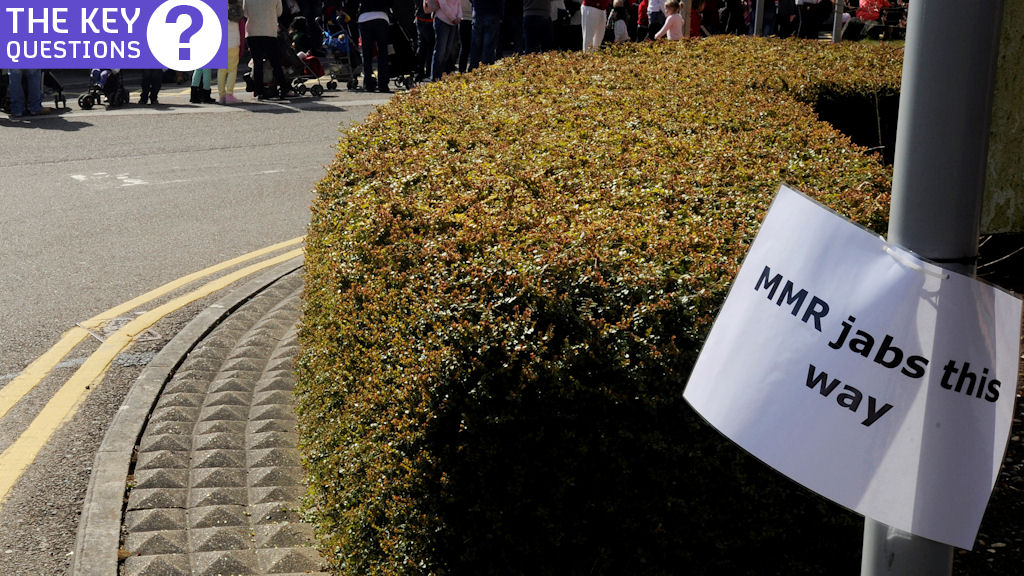Measles outbreak – the key questions
As the government launches a vaccination campaign to try to stop the spread of measles, how serious is the current outbreak? And what should you do if you are worried you or your family are at risk?

How serious is the current measles outbreak?
In Wales, particularly around Swansea, it is an epidemic: the number of suspected cases jumped by 56 in just two days this week. In total, there are 942 suspected cases and last week a 25-year-old man who had measles died, although it is not yet clear whether measles caused his death.
Now the government has launched a £20m vaccination drive to try to stop the outbreak spreading to England – but it might be too late. There have already been 587 confirmed measles cases in the first three months of the year in England – more than three times as many cases as the same period in 2012.
Dr David Elliman, immunisation spokesman at the Royal College of Paediatrics and Child Health, told Channel 4 News: “We have been monitoring confirmed cases since 1996 – almost 20 years – and this is the highest [number of cases] we have had in that period.”
Why are so many people catching measles?
There has been an increasing rise in cases in recent years as the consequences of the MMR scare – when a doctor linked the measles, mumps and rubella jab to autism, putting people off the vaccination – comes back to haunt parents.
In the late 1990s, Dr Andrew Wakefield and some other academics looking into links between autism and bowel problems published a paper in which many parents of children with autism said they remembered the symptoms coming on after their children had their MMR jabs.
The paper was cautious, but Dr Wakefield was less so, telling a news conference he would advise parents to steer clear of the combined jab. Then in the early 2000s, Tony Blair fanned the flames by refusing to reveal whether his son Leo had had the combined vaccination.
Studies since have failed to show any link between MMR and autism, but the scare put a lot of people off getting their children vaccinated. As a result, rates of immunisation went down by around 10 per cent to 82 per cent.
“The sad thing is we had got to the stage where measles was uncommon, you could almost say it had been eliminated. Now it’s back, unfortunately,” said Dr Elliman.
What are the risks?
At worst, measles can kill. According to Dr Elliman, recent outbreaks in Europe have had death rates of between one in 1,000 and one in 3,000.
“One of the difficulties is that measles is a virus, so it’s not a bacterial infection where you can give antibiotics and alter the course of the disease. There’s very little you can do,” he said.
Of course, on top of measles there are other complications – pneumonia, meningitis, gastroenteritis. It can lead to convulsions and inflammation of the ear. Through most of childhood, it is not too bad, but as children get older and enter adolescence, it becomes more serious. For young adults, it can also be a serious illness.
“We are worried because it is this group – aged between 10-16 – who are under-immunised,” said Dr Elliman.
But for most people, it is a fairly unpleasant three to five days with a temperature, a rash, feeling unwell and staying in bed – there is even a term, the “measles miseries” to describe sufferers.
Who is at risk?
The government is targeting 1 million people with its new vaccination drive, a group made up mainly of three kinds of people: children aged 10-16 who only had one dose of the immunisation, rather than two (two gives better immunity for all three diseases); children who did not have the jab at all; and children under 10 or young adults who are not immunised.
Experts are particularly worried about certain areas of the country, such as London, which traditionally have lower rates of immunisation.
The older children get, the higher rates of immunisation are needed to prevent the spread of the disease, because they tend to be in contact with more people. For secondary school children and beyond, around 95 per cent immunity is needed.
“So we are seeing a double whammy – those children who are going into secondary school where they are more at risk are the ones who are likely to be un-immunised or under-immunised,” said Dr Elliman.
I’m worried – what can I do?
“Contact your GP and arrange to go and have it done,” is Dr Elliman’s response.
Having two doses of the MMR jab gives close to 100 per cent protection against rubella; 99 per cent against measles; and in the 90s for mumps.
“I see parents who say I don’t want to take any risks and I agree entirely. But we have an enormous amount of data around MMR. Countries that can afford MMR use MMR. The safe option is – go for MMR,” he added.